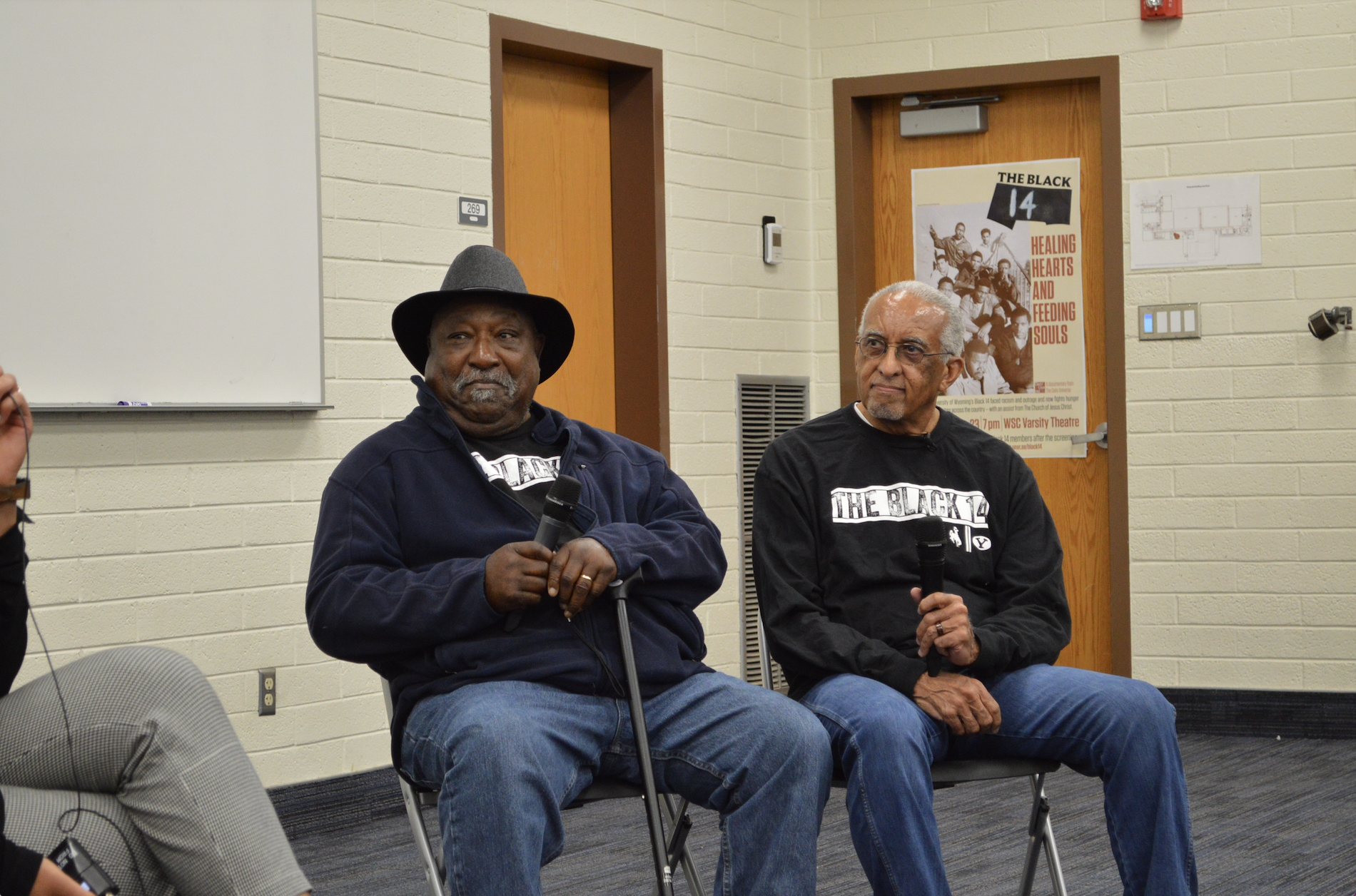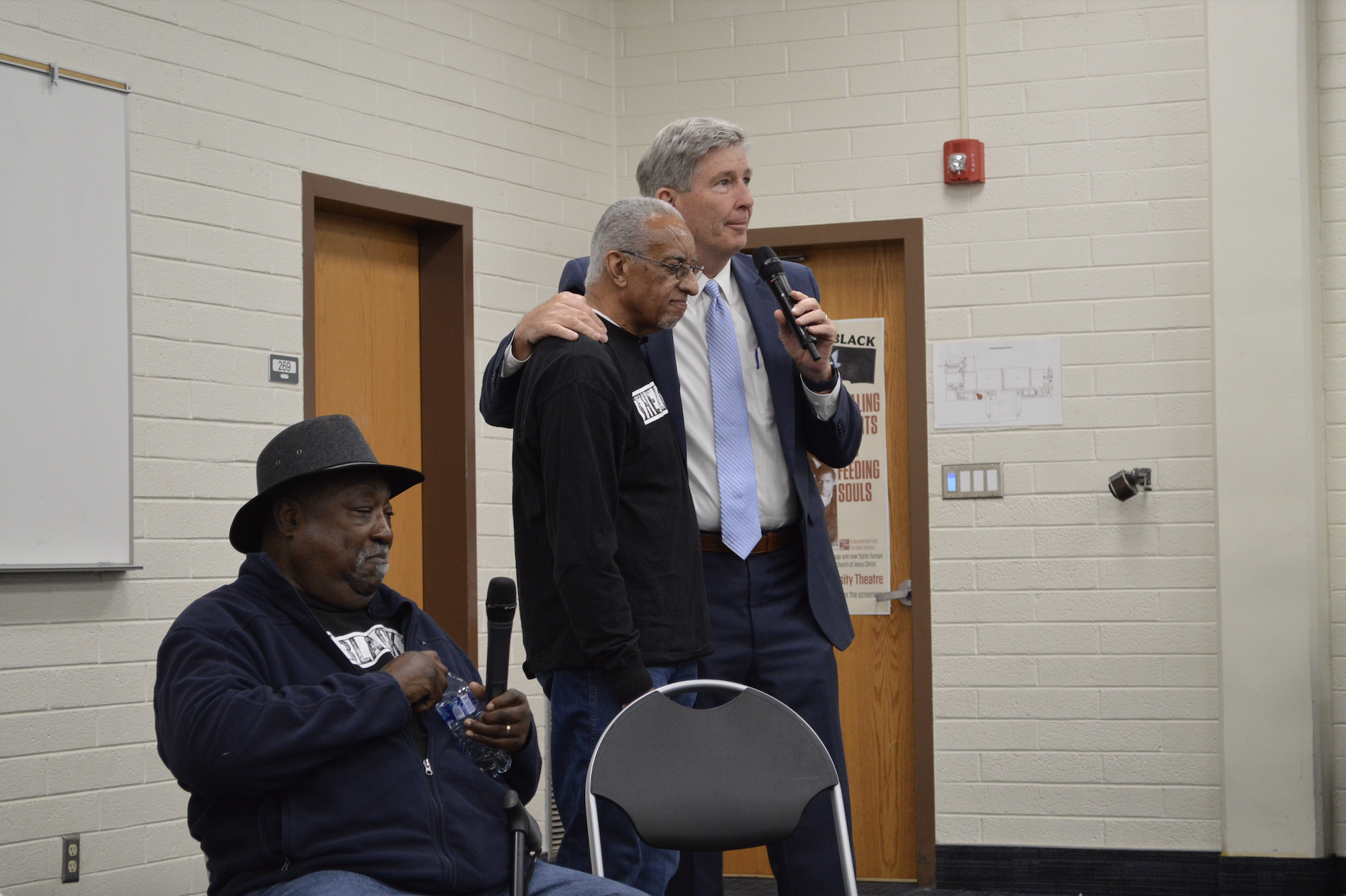
BYU Athletics and the Office of Belonging hosted the first ever screening of “The Black 14 Healing Hearts and Feeding Souls” Sept. 22, honoring two Black 14 attendees for their contributions to the documentary.
The event was a private screening for BYU athletes and athletic staff. Black 14 members John Griffin and Mel Hamilton were present to view their story on-screen.
Also in attendance were Elder S. Gifford Nielsen of the Seventy; Area Seventy Elder Blaine R. Maxfield, managing director for Welfare and Self-Reliance services for the Church; and Dean Witt, Area Welfare and Self Reliance manager.
The documentary will premiere to the public on Sept. 23 at the Wilkinson Student Center Varsity Theatre at 7 p.m.
The documentary tells the story of the Black 14, University of Wyoming football players who were kicked off of their team in 1969 after requesting to protest racist behavior from BYU’s team. Over 50 years later, the football players have partnered with The Church of Jesus Christ of Latter-day Saints to provide food-insecure communities with truckloads of resources.
“This is a story of peace and love and reconciliation through service,” said Whitney Catt, the associate athletic director for Student-Athlete Development, Diversity and Inclusion.
According to Catt, the private screening was also held as a reconciliation between the Black 14 and the BYU community. She said it visually acknowledges the part that BYU had to play in the racism that took place in 1969.
“I feel like this is such a powerful story for Black students who are really struggling with the racism that they’ve seen in the Church,” Catt said. “It’s powerful to be able to visually see that bridges can be made.”
During the Q&A panel held after the end of the film, both Hamilton and Griffin said their transitions from pain to joy were long and difficult.
Hamilton described it as a “rocky road” and said he did not watch a football game for 20 years. The experience of being kicked off of the team “hurt” and “really changed” him; normally an outgoing person, he became closed off and withdrawn.
By the time he returned to watching football, he said he was ready to “get over the hurt.”
“For some reason, watching that football game sort of made me realize what I was missing,” Hamilton said. “When you go from that stance, oddly enough, you start to love people again.”
Griffin said he harbored anger until the 1980s, when he decided that the anger was not helping him. He said that he would not soon forget, but he certainly would not let the acts of racism define the rest of his life.
“It was a tragedy turned into philanthropy; in essence, that’s what we’ve done,” Griffin said. “We took 53 years ago and we’re doing something that’s pretty darn special, and we’re not done yet.”
According to Griffin, the Black 14’s next step in partnership with the Church is to replicate their food delivery service in different communities across the country.
“That’s exactly what the recipients of our food deliveries are doing,” Griffin said. “They’re giving back within their communities with the excess of food that we’ve given them.”
Elder Nielsen, who is also featured in the documentary, stood to speak about the love he feels for Griffin and Hamilton, whom he called his “brothers.”

“This is teamwork — this is what life is all about,” Nielsen said. “It’s giving somebody food, so they can give somebody else food, so they can give somebody else food, so they can give somebody else food and it perpetuates itself.”
Kennethia Dorsey, a member of the Black Menaces, a group of social media creators who facilitate conversations about inequities at BYU, said that while she had heard of the Black 14 before, she was pleasantly surprised to learn about their partnership with the Church through the documentary.
“If they feel like they’ve gotten the justice for it then I’m happy for them,” Dorsey said. “I think an apology from BYU would’ve been nice, but obviously I wasn’t in their shoes.”
The screening was Hamilton’s and Griffin’s first time seeing the finished documentary. Hamilton said that it was “fantastic” to see it focus on their service to communities in need.
“That’s where our history is; that’s what our legacy is. I loved it,” Griffin said.
Hamilton said that he felt humbled when he saw his story told on screen, and “real proud” of the students who created the film.
“What better medium could you use to tell your story and have generations and generations to remember and hear about it?” Hamilton said. “If we can reach one out of a hundred to take something away from that, then it’s worthwhile.”
The trailer for the documentary can be viewed here.




